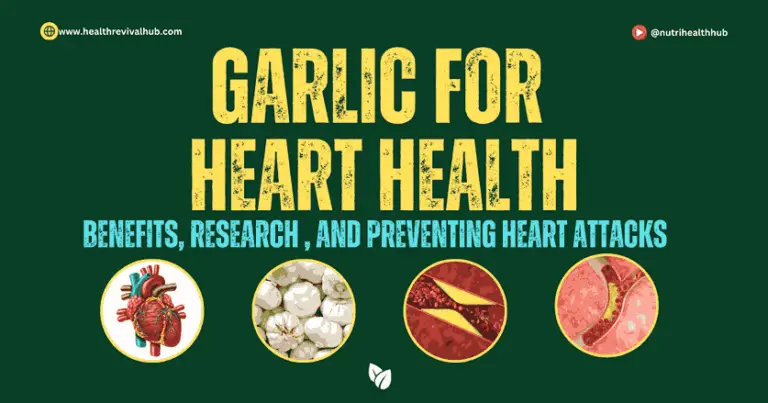Introduction:
Garlic, a kitchen staple revered for its flavor and medicinal properties, has gained significant attention for its role in promoting heart health.
For centuries, garlic has been used for a variety of health-related purposes, and modern research has supported many of these age-old claims.
In particular, garlic’s potential benefits for heart health have sparked interest.
From lowering cholesterol and blood pressure to preventing heart attacks, garlic’s medicinal properties may hold the key to a healthier heart.
This blog post delves into the science behind garlic’s heart-health benefits, summarizes the research findings, and provides practical insights on how to incorporate garlic into your diet for optimal cardiovascular health.
Garlic and Heart Health: The Science Behind It
Garlic(Allium sativum) is rich in sulfur-containing compounds such as allicin, which is believed to be the active component responsible for its heart-healthy effects.
Studies have shown that garlic can have a positive impact on several cardiovascular risk factors, including blood pressure, cholesterol, and arterial plaque buildup.
Blood Pressure Reduction:
Garlic has been shown to lower both systolic and diastolic blood pressure in people with high blood pressure.
A 2016 meta-analysis published in The Journal of Clinical Hypertension found that garlic supplements significantly reduced blood pressure, especially in individuals with hypertension.
This is attributed to garlic’s ability to relax blood vessels and improve circulation.
Lowering Cholesterol Levels:
Garlic has also been found to lower total cholesterol and LDL (low-density lipoprotein, also known as “bad” cholesterol) levels.
Research has suggested that garlic can inhibit the enzymes responsible for the production of cholesterol, thus preventing its accumulation in the arteries.
Preventing Atherosclerosis:
Atherosclerosis, or the hardening of the arteries, is a leading cause of heart disease.
Garlic may help prevent atherosclerosis by improving blood circulation and preventing the buildup of plaque in the arteries.
Studies have shown that garlic’s antioxidant and anti-inflammatory properties may help reduce the oxidative stress and inflammation that contribute to arterial plaque formation.
Research Findings on Garlic and Heart Disease Prevention
Numerous studies have been conducted to explore garlic’s impact on heart health. Here’s a summary of key research:
Cholesterol-Lowering Effects:
A systematic review of randomized controlled trials (RCTs) published in The American Journal of Clinical Nutrition concluded that garlic supplementation could reduce total cholesterol by about 10% in individuals with elevated cholesterol levels.
A study conducted by the National Institutes of Health (NIH) found that aged garlic extract was particularly effective in lowering cholesterol and triglyceride levels.
Blood Pressure Regulation:
Garlic has shown promise as a natural remedy for high blood pressure.
According to a study in the BMC Complementary Medicine and Therapies journal, garlic supplementation led to a significant decrease in both systolic and diastolic blood pressure among people with hypertension.
Heart Attack Prevention:
Garlic may play a role in reducing the risk of heart attacks. A study published in The Journal of Nutrition in 2019 found that garlic consumption improved platelet aggregation and prevented clot formation, which is a major risk factor for heart attacks.
Regular garlic intake was linked to reduced blood clotting, further supporting its role in heart disease prevention.
How Garlic Helps in Preventing Heart Attacks
A heart attack occurs when the blood supply to a part of the heart muscle is blocked, often due to a buildup of plaque or a blood clot.
Garlic’s ability to lower cholesterol, reduce blood pressure, and prevent plaque buildup can help reduce the risk of this dangerous event.
Additionally, garlic’s anti-inflammatory properties help prevent the inflammation of blood vessels, which is another contributing factor to heart attacks.
Antioxidant Properties:
Garlic is rich in antioxidants, which help fight oxidative stress in the body.
Oxidative stress is linked to a variety of cardiovascular diseases, including heart attacks.
By scavenging free radicals, garlic helps reduce the damage caused by oxidative stress and supports overall heart health.
Anti-Platelet Activity:
Garlic has natural anti-platelet effects, meaning it helps prevent the blood from clotting excessively.
This reduces the likelihood of blood clots forming and blocking arteries, thus lowering the risk of a heart attack.
How to Incorporate Garlic into Your Diet
Adding garlic to your diet is simple, and there are various ways to enjoy its health benefits:
- Raw Garlic: Eating raw garlic ensures that you receive the full benefits of allicin. Chop or crush fresh garlic cloves and let them sit for a few minutes to activate the allicin before adding it to salads or smoothies.
- Cooked Garlic: While cooking may reduce some of the allicin content, garlic still retains many of its beneficial properties. Add garlic to stir-fries, soups, and stews for flavor and heart health benefits.
- Garlic Supplements: If you don’t like the taste of garlic, garlic supplements, such as aged garlic extract, are available in capsule form.
Tip: Consuming two to three cloves of garlic daily is recommended for heart health benefits.
Potential Side Effects of Garlic.
While garlic offers numerous health benefits, consuming it in excess can lead to some potential side effects. Here are the main risks:
Gastrointestinal Issues:
Garlic, especially when consumed raw or in large amounts, can cause digestive discomfort. This includes symptoms such as bloating, gas, heartburn, and nausea.
The compounds in garlic can irritate the stomach lining, leading to these issues, particularly in sensitive individuals.
Blood Thinning:
Garlic has natural anticoagulant (blood-thinning) properties, which can be beneficial for heart health.
However, for individuals on blood-thinning medications like warfarin, consuming large amounts of garlic may increase the risk of excessive bleeding or interfere with the effectiveness of these medications.
It’s important to consult a healthcare provider before significantly increasing garlic intake in such cases.
Allergic Reactions:
Some people may experience allergic reactions to garlic, ranging from mild symptoms like skin rashes to more severe responses like difficulty breathing.
Although rare, individuals with garlic allergies should avoid its consumption.
Odor and Breath Issues:
Garlic’s strong sulfur compounds, particularly allicin, can cause persistent bad breath (halitosis) or body odor.
This is generally not harmful but can be a social inconvenience.
Interaction with Medications:
Garlic can interact with certain medications, such as those for blood pressure or diabetes, potentially altering their effects.
It’s essential for people taking medications regularly to discuss garlic consumption with their doctor to avoid potential interactions.
While garlic is generally safe for most people, it’s always a good idea to moderate intake and consult a healthcare provider if you have any concerns, especially if you’re on medications or have underlying health conditions.
Conclusion:
Garlic is not just a flavorful ingredient in cooking but a powerful ally in maintaining a healthy heart.
From reducing blood pressure and cholesterol to preventing heart attacks, the benefits of garlic for heart health are well-supported by scientific research.
By incorporating garlic into your daily diet, you can take proactive steps to protect your heart and reduce the risk of cardiovascular diseases.
Frequently Asked Questions:
1. What are the health benefits of garlic for the heart?
Garlic is widely recognized for its cardiovascular benefits, including lowering blood pressure, reducing cholesterol levels, and preventing heart attacks.
The active compound in garlic, allicin, has been shown to help reduce oxidative stress, improve circulation, and prevent the buildup of plaque in arteries.
Regular consumption of garlic can significantly reduce the risk of heart disease by improving overall heart health.
2. How does garlic lower blood pressure?
Garlic helps lower blood pressure by relaxing the blood vessels and improving blood flow. Studies have shown that garlic supplementation can reduce both systolic and diastolic blood pressure in individuals with hypertension.
The sulfur compounds in garlic, such as allicin, are thought to enhance the body’s natural ability to dilate blood vessels, reducing the strain on the heart.
3. Can garlic prevent heart attacks?
Yes, garlic can help reduce the risk of heart attacks by improving cardiovascular health. Its anti-platelet properties prevent blood clot formation, which is a leading cause of heart attacks.
Additionally, garlic’s ability to lower cholesterol and blood pressure further decreases the likelihood of a heart attack.
Garlic’s anti-inflammatory effects also protect the arteries from damage, thus preventing the conditions that lead to heart attacks.
4. How much garlic should I eat to lower cholesterol?
Studies suggest that consuming 2-3 cloves of garlic per day can significantly lower total cholesterol and LDL cholesterol (the “bad” cholesterol).
Garlic supplements, such as aged garlic extract, are also effective in lowering cholesterol levels.
Always consult a healthcare provider to determine the appropriate dosage, especially if you’re on cholesterol-lowering medication.
5. What is the best way to consume garlic for heart health?
For optimal heart health benefits, consuming raw garlic is often recommended, as it contains the highest levels of allicin, the active compound responsible for garlic’s heart-protective properties.
Crushing or chopping fresh garlic and letting it sit for a few minutes before eating activates allicin.
If you prefer a more palatable option, cooked garlic or garlic supplements are also effective, though cooking may reduce some of the beneficial compounds.
6. Are there any side effects of eating garlic for heart health?
While garlic is generally safe for most people, excessive consumption can lead to gastritis, heartburn, and bloating.
Individuals on blood-thinning medications should be cautious, as garlic has natural anticoagulant effects and could increase the risk of bleeding.
It’s best to consult with a healthcare provider if you have concerns about garlic interacting with medications.
7. Does garlic help with high blood pressure naturally?
Yes, garlic has been shown to be effective in lowering high blood pressure (hypertension).
Several studies have found that garlic supplementation can significantly reduce both systolic and diastolic blood pressure.
The sulfur compounds in garlic relax blood vessels, making it easier for blood to flow and reducing the pressure on the heart.
8. Can garlic improve circulation and heart health?
Garlic can improve blood circulation by helping to lower blood pressure, prevent plaque buildup, and enhance the flexibility of blood vessels.
Regular garlic consumption has been shown to improve overall cardiovascular health, making it an excellent addition to your diet for improving circulation and heart function.
9. Is it better to eat garlic raw or cooked for heart health?
Raw garlic is generally more beneficial for heart health because it contains higher levels of allicin, the active compound that helps reduce blood pressure, lower cholesterol, and prevent blood clotting.
However, cooked garlic still retains many of its heart-healthy properties, making it a good alternative for those who do not enjoy raw garlic.
For maximum benefits, consider combining both raw and cooked garlic in your diet.
10. Can garlic supplements replace fresh garlic for heart health?
Garlic supplements, such as aged garlic extract, are a convenient option for those who dislike the taste of garlic or have difficulty consuming fresh garlic.
Several studies have shown that garlic supplements are effective in lowering cholesterol, blood pressure, and reducing the risk of heart disease.
However, fresh garlic is the best option to maximize the benefits, as it contains the highest levels of bioactive compounds.
If you opt for supplements, choose high-quality products that contain a sufficient amount of allicin.
https://youtu.be/ss2mrc0-W2E

